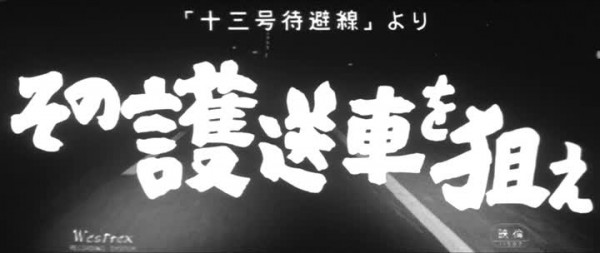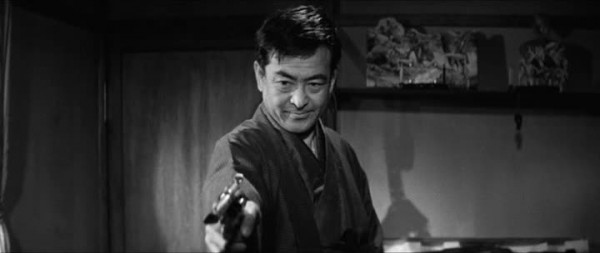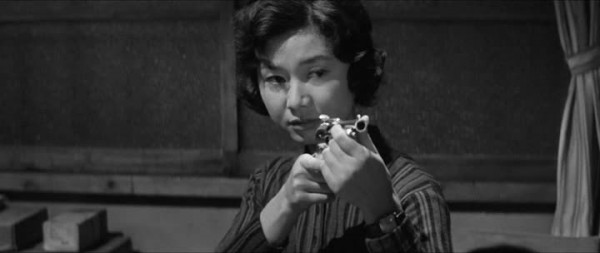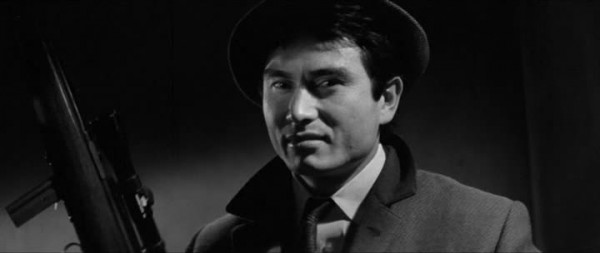Take Aim at the Police Van
aka その護送車を狙 aka Sono gososha o nerae: ‘Jusango taihisen’ yori

1960![]()
Screenplay by Shinichi Sekizawa
Based on a story by Kazou Shimada
Directed by Seijun Suzuki

The Nikkatsu borderless action train continues, this time with a police guard looking to uncover the conspiracy to kill prisoners that he took the fall for. Take Aim at the Police Van gets attention as an early piece from Seijun Suzuki, before he got bored enough to try the widespread experimentalization of his flicks.
Michitaro Mizushima (Underworld Beauty) stars as Daijiro Tamon, the guard on a police prisoner transport van that is hit with gun fire and two prisoners are killed. Because someone must take the blame, Tamon is suspended for six months, which gives him plenty of time off to find out who shot at the van and why. Thus begins an investigation that will see Tamon sucked into the world of sex trafficking, hidden behind fronts of modeling agencies. This gives an excuse to have lots of attractive women running around, which gets even more glaring as most of the male characters range from seedy to extra seedy to so full of seeds they’re being sold at garden supply stores.

Tamon distinguishes himself as a guard because he treats the prisoners fairly, this gives him enough of a reputation that he gets more doors opened to him when he starts hunting for clues. It also seems to say something about the Japanese prison system if just treating someone like a human being is commendable behavior. Not that we have problems like that in modern day America…
The prisoners that were killed don’t seem to be connected at all, but the more Tamon digs, the more he finds connections to something bigger. A missing sister to one of the prisoners who was working as a dancer is connected to another dancer that was watching the police van just before it was fired upon. The dancer, Tsunako Ando (Mari Shiraki), is dating another prisoner from the van, Goro Kashima (Shoichi Ozawa), who has a mysterious new job that he promises will earn a lot of money. And everyone seems connected to the Hamaju Talent Agency run by Yuko Hamashima (Misako Watanabe), who took over when her father Jube (Shinsuke Ashida) fell ill. But a rival firm has popped up and they are poaching each others’ talent.

Yuko Hamashima soon starts showing up wherever Tamon is investigating, throwing on the charm while mockingly dropping hints. She’s also a crack shot with a bow and arrow, while the missing sister dancer from earlier is felled by an arrow to the chest. But she’s also attracted to Tamon, leading to her intervening when more lethal players in the game try to bump him off.
The large amount of various goons of the different factions threatens the clarity of the story, but a dream sequence after Tamon is beaten on the head gives us a handy recap of the major players and sets up the final act. The rival talent firm is a bait and switch that plans to sell the girls overseas, and Yuko ends up teaming up with Tamon, as she is the daughter of a woman who was sold into sex slavery. She also claims she learned to see the talent as people because Tamon’s treating everyone as equal inspired her. Whichever factor is the real motivator, she and Tamon both become marked by the rival firm.
Tough player Michitaro Mizushima works well as a seasoned tough guy looking for answers. He has enough natural detective skills that he remains ahead of the police investigation on the attack (and is even friends with the lead officer, Takamura (Tatsuo Matsushita)) His age (and the fact he’s married, even though is wife is rarely seen or mentioned after the first few minutes of the film) make the love interest with Misako Watanabe as bit on the unbelievable side. His character is mentioned so often as treating everyone well, but they don’t really show him treating people well beyond being concerned for their safety in the beginning when someone is shooting at the van, which becomes sort of annoying.
The investigation phases mean the action scenes for most of the picture are sparse and quick, but the finale features characters tied up in a runaway truck leaking gas that’s set ablaze, causing a river of death chasing the helpless heroes. The final battle takes place in a trainyard, which gives lots of interesting locations for people to punch and shoot at each other. The secret leader of the rival talent agency/sex trafficking gang makes his appearance as they are packing up the girls, and though he spent most of the film trying to remain secret, he exposes his identity to his entire outfit with that action.
Fun scenes and nice touches include the aforementioned runaway truck sequence, Yuko absently playing with her doll while talking with coworkers, and Goro compulsively writing names while he waits. The increasing disapproval and disgust on Mari Shiraki’s face as she finds out what her boyfriend’s job actually is helps seal just what a bad person Goro has become, blinded by lust for money.
But Take Aim at the Police Van isn’t about the flaws, it’s about people treating fellow humans as disposable commodity, and the one man who can put a stop to it just happens to be someone who already cares about people in the first place, and inspires others to do better based on his reputation alone. He’s the type of hero you want to have in your film, and someone you want to see succeed. Take Aim at the Police Van was released as part of the Nikkatsu Noir boxed set from Criterion, and fits in nicely with the rest of the collection.

Rated 7/10 (logo, in this area, caution, aki, backpack, frog time, Katniss lives)
Please give feedback below!

























